How to Avoid Bug Bites While Camping [Super Easy Tips!]
![How to Avoid Bug Bites While Camping [Super Easy Tips!]](/content/images/size/w1200/2023/07/How-to-Avoid-Bug-Bites-While-Camping.jpg)
Almost everyone enjoys camping, but most of us HATE bugs…especially getting bit by them!
One of the common challenges encountered outdoors is how to avoid bug bites while camping. Being itchy, uncomfortable, and sometimes in pain puts a damper on any kind of fun. Learning how to avoid bug bites is mandatory.
In this article, I’ll offer proven strategies to prevent mosquito bites (and other critters) while camping, including keeping insects out of your tent and clothing, using natural and commercial repellents, and understanding key factors that attract insects in the first place.
I recommend certain products because they're genuinely helpful, and I own many of them myself. As an Amazon Associate, I may earn a small commission if you grab something using my referral links. However, there's never any extra cost to you, my fellow nomad.
Let’s dive in…
Choosing the Right Campsite to Prevent Bug Bites
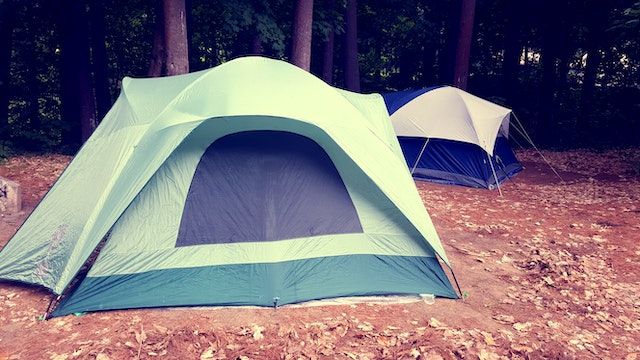
When planning a camping trip, selecting the right campsite is going to be your first (and best) line of defense to help keep bugs away.
A well-chosen campsite can minimize your exposure to critters such as mosquitoes, ticks, and flies, making insect bites happen with much less frequency.
For starters, consider the type of terrain you will be camping on. Avoid setting up camp on tall grass or near dense brush and vegetation, as these areas are more likely to harbor ticks and other insects. Instead, opt for a cleared area with minimal ground cover.
Proximity to water is another crucial factor to consider. It is wise to avoid camping too close to waterways, such as rivers, streams, or lakes. While a water source may be convenient for activities, it can also attract insects, especially mosquitoes. Stagnant or standing water in particular is a breeding grounds for mosquitoes. Aim to camp at least 200 feet away from these sources to reduce the risk of bug bites.
Another aspect to take into account is the location of your campsite relative to trails or other popular areas. Setting up camp away from heavily-trafficked paths can help lessen the likelihood of coming into contact with ticks and other pests, as these insects are often attracted to the presence of humans and animals.
By choosing your campsite wisely you’ll decrease the amount of critters in your space in a major way.
A quality tent will work wonders on keeping icky critters away. You can check out my picks here for the best car camping tents.
Insect-Repellent Clothing Options
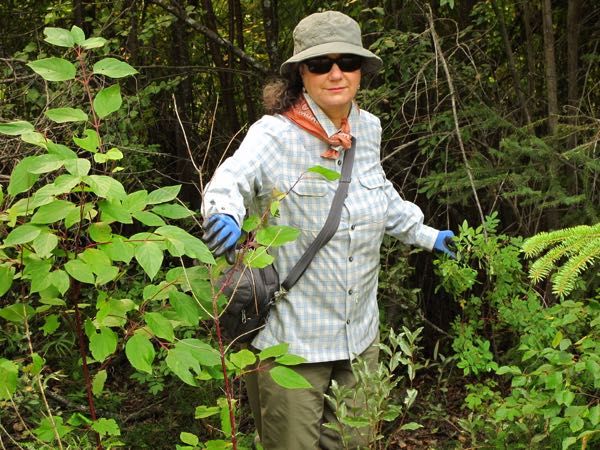
Wearing the right clothing can significantly reduce the chances of bug bites while camping. Choose clothing that covers most of your skin, such as long pants and long sleeve shirts. This not only provides a physical barrier against insects, but also helps prevent them from detecting body heat and odors that attract them.
When selecting clothing, opt for lightweight and breathable materials to maintain comfort in warmer weather. It's also wise to choose light-colored clothing, as darker colors tend to attract mosquitoes and other biting insects. Additionally, tuck your pant cuffs into your socks to provide an extra layer of protection and prevent bugs from crawling up your legs.
Another aspect to keep in mind is the fit of your clothes. Loose-fitting clothing can deter insects from coming into direct contact with your skin. However, avoid garments that are too loose, as they may inadvertently provide hiding spots for bugs.
Regarding shoes, opt for closed-toe styles to protect your feet from bites and stinging insects. Hiking boots or trail shoes with good ankle support are ideal for most camping situations and will also shield your feet from uneven terrain or sharp objects.
Lastly, consider wearing a hat with a wide brim to protect your face, neck, and ears from insects. You can even add a mosquito net to your hat if you're camping in areas with a high concentration of bugs.
By implementing these clothing tips and paying attention to the material, color, and fit of your garments, you can minimize bug bites very effectively.
Insect Repellent Sprays, Lotions and Oils for Camping [Natural + Commercial Options]
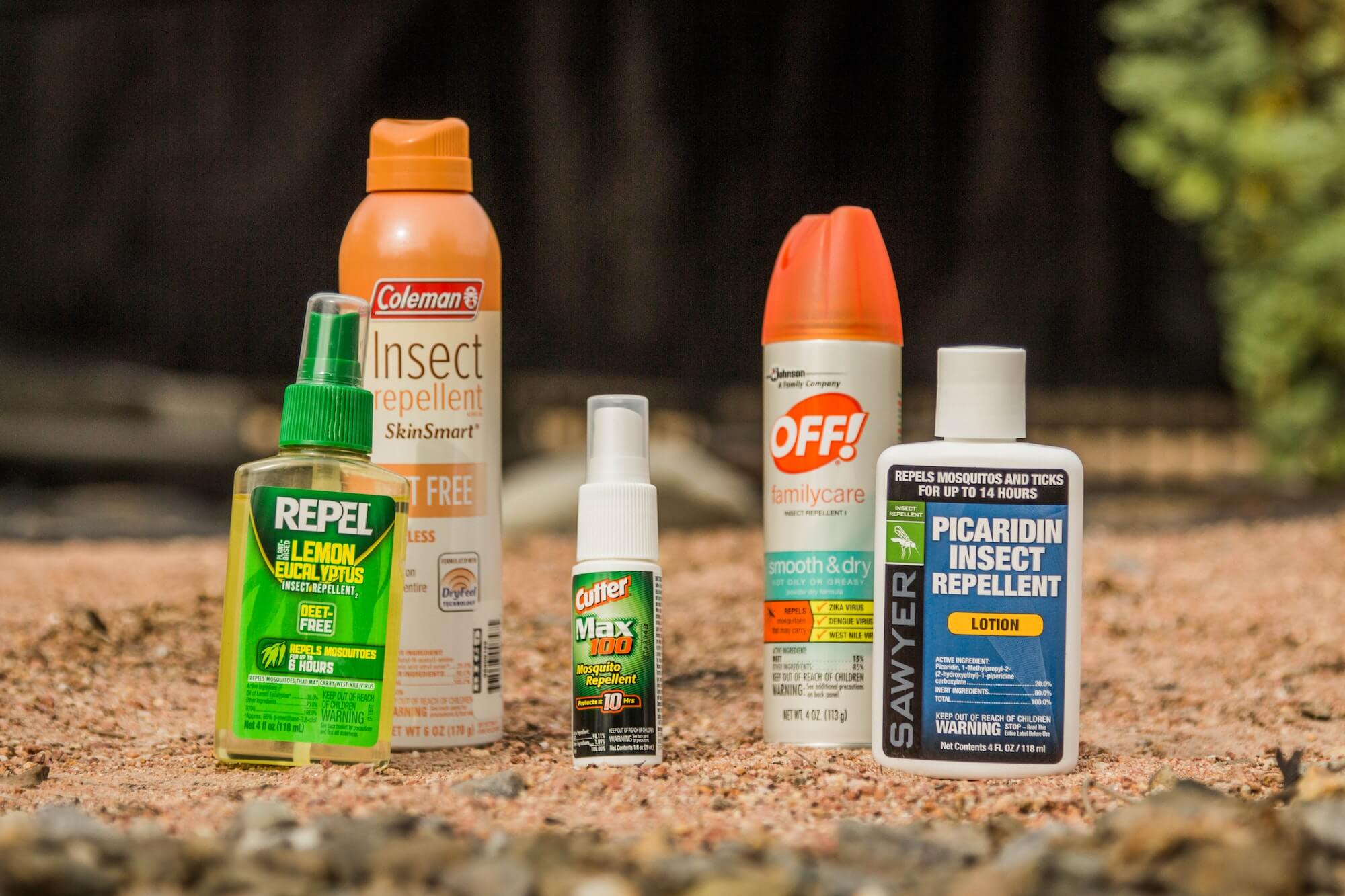
Insect repellents and bug sprays play a major role in protecting you from bug bites while camping. There are a variety of repellents available on the market, most of which are safe and effective when used correctly.
The Environmental Protection Agency (EPA) registered ingredients like DEET, permethrin, picaridin, IR3535, and 2-undecanone are commonly found in these products.
DEET is one of the most widely used and effective insect repellents. It works by confusing the insects' sense of smell, making it harder for them to locate you. DEET products come in various concentrations, with higher concentrations providing longer-lasting protection.
Permethrin is another effective repellent, but it should only be applied to clothing, tents, and other camping gear, not directly on the skin. It works by disabling an insect's nervous system, eventually causing its death.
Picaridin and IR3535 are also EPA-registered ingredients that are effective against various bugs, including mosquitoes, ticks, and flies. These repellents have a lower risk of skin irritation compared to DEET.
2-Undecanone is a bio-based repellent derived from the wild tomato plant. It is an effective alternative to synthetic repellents and is particularly useful against ticks and mosquitoes.
For those who prefer natural repellents, there are a variety of essential oils and botanical ingredients that can help keep bugs at bay, like the ones below.
Citronella is a popular natural repellent, often used in candles and torches to create a bug-free zone around the campsite.
Lemon eucalyptus oil and its synthesized version, para-menthane-diol (PMD), have also shown effectiveness in repelling mosquitoes. The CDC recommends using products containing oil of lemon eucalyptus or PMD for protection against mosquitoes carrying West Nile virus.
Natural bug sprays containing a blend of essential oils, such as mint, lemon, and eucalyptus, can be helpful in deterring insects. However, they might need to be reapplied more frequently than synthetic repellents.
Always follow the manufacturer's instructions when using insect repellents. Apply them evenly on exposed skin and avoid contact with eyes, mouth, and irritated skin. Combining the use of repellents with protective clothing and proper campsite management will significantly reduce the chances of bug bites during your camping adventure.
By far, the absolute BEST product I’ve ever used to repel mosquitoes and other insects is a Thermacell (pictured below)!!! It is EXTREMELY effective, as it creates a shield 4-5 feet around your body, which drives away about 99% of pests. Seriously, get one and thank me later.
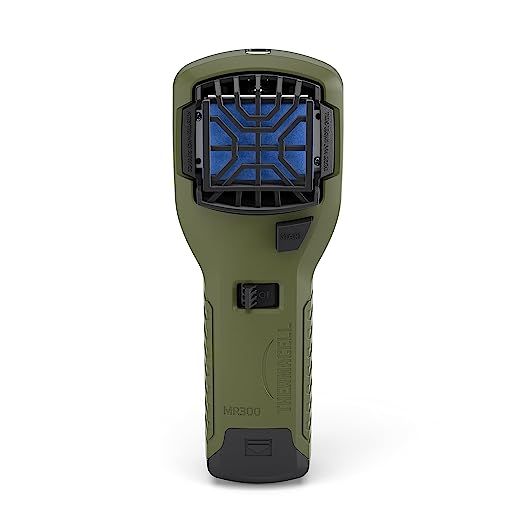
Thermacell MR300 Portable Mosquito Repeller; Includes 12 Hours of Refills [No Spray, No DEET, No Open Flame] Scent-Free Bug Spray Alternative
Simply put, an amazing product. Works wonders to combat mosquitoes and other pests.
Mosquito Nets, Lanterns & Bug Zappers for Camping
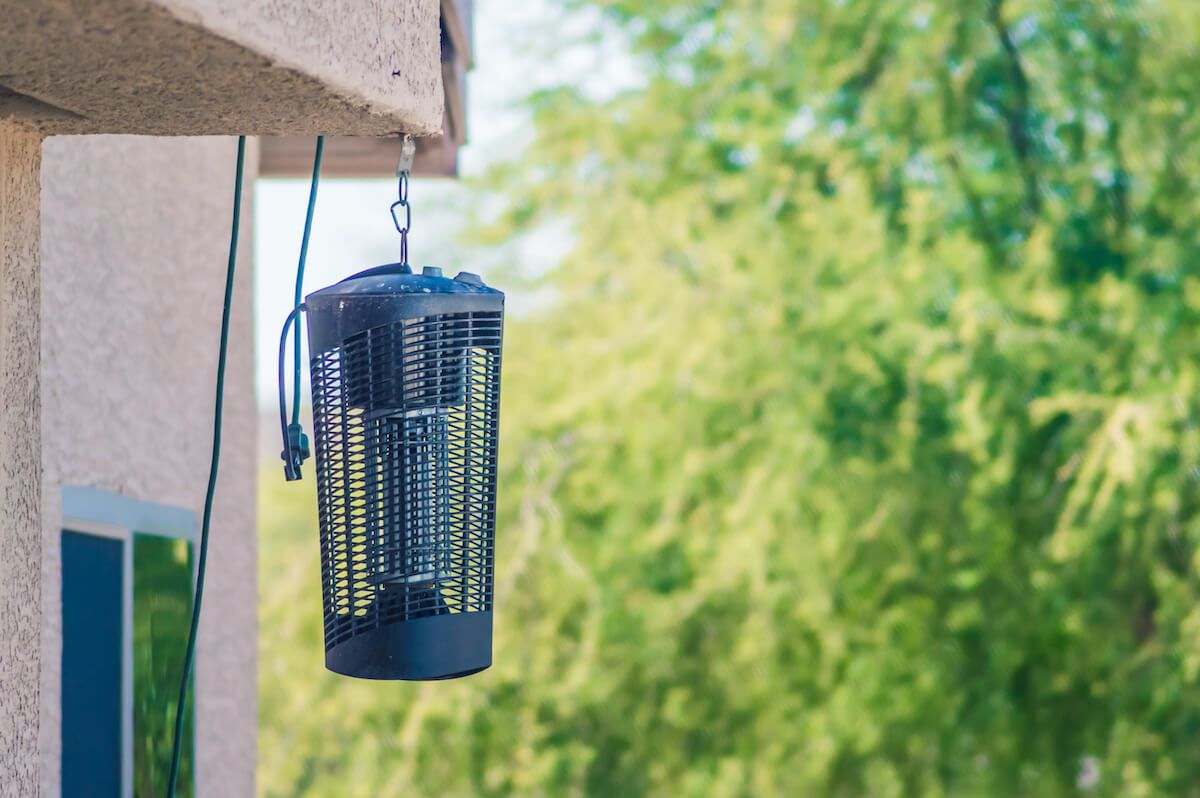
Having the right gear is one of the best ways prevent bug bites while camping, and is well worth the small investment.
A mosquito net is a simple but insanely effective way to keep mosquitos at bay (as well as other critters). It provides a barrier between you and any insects while sleeping, which means you can avoid itchy bites and remain bug free while getting some zzz’s. Choose a net treated with insecticide or mosquito repellent for extra protection.
The downside to mosquito nets is, er, well…wearing them. They look a bit goofy and they’re a pain to take on & off, but bottom line, they DO work.

Anvin Mosquito Head Mesh Nets [Works Over Most Hats] Comes with Free Stock Pouches (3pcs, Black)
Screens, doors, and vents are essential for proper air circulation inside your tent. Windows with screens or bug nets keep insects out while allowing fresh air to enter. Be sure to check for any holes or tears in the screens before setting up.
Lanterns and other sources of light attract insects at night. To minimize this, opt for lanterns or flashlights specifically designed for camping and bug prevention. Some lanterns have built-in bug repellent features to deter insects further.
Invest in a fan to provide comfort, air circulation, and keep bugs at bay. Fans create a breeze that insects find difficult to navigate, reducing their presence near your campsite.
Adding a screen room to your camping setup may seem like an extra step, but it's worth it if you want a bug-free zone. A screen room is an enclosed space that lets you cook, relax, and hang out without worrying about pesky insects.
Bug zappers are another helpful camping gadget. Attracted by the ultraviolet light, insects come close to the device only to be electrocuted.
Place a bug zapper away from your main camping area to avoid drawing bugs too close to you.
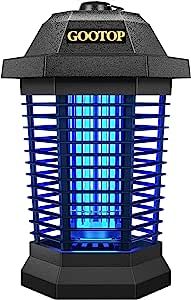
GOOTOP Outdoor Electric Bug/Mosquito/Fly Zapper, 3 Prong Plug, 90-130V, ABS Plastic Outer Shell (Black)
While you can never avoid critters completely, with the right camping gear you’ll significantly reduce the chances of annoying bites from mosquitoes and other bugs.
Campsite Maintenance to Keep the Critters Away
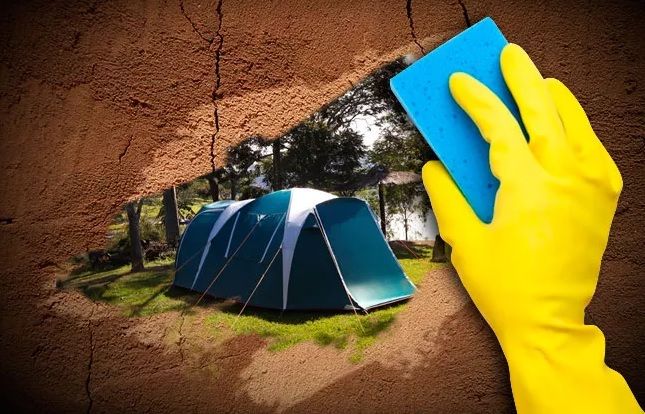
Maintaining a clean and organized campsite is one of the best ways to prevent bug bites. Here are a few practical ways to avoid insects on your next camping trip…
First and foremost, manage your campfire and smoke effectively. Burning natural insect-repellent materials like sage is a powerful way to keep bugs away. In addition, the smoke from your campfire alone will make the site less appealing to mosquitoes and other biting insects.
Dispose of dishes and food waste promptly. Wash dishes immediately after each meal, and avoid leaving food scraps or dirty cookware lying around the campsite. Insects are attracted to the smell of food, so clean cooking areas and eating utensils thoroughly to minimize odors that could attract bugs.
Keep your campsite trash-free as much as possible. Designate a specific area for trash and ensure it is tightly sealed in containers or bags. You should also store food in secure and airtight containers to prevent curious insects from getting inside. If possible, remove the trash regularly to minimize bug presence around your campsite.
Manage pet waste by cleaning up after your furry friends as soon as possible. Insects, particularly flies, are attracted to the smell of pet waste. Bag it up, and place it in a designated trash area away from your sleeping and eating spaces.
Keeping your camping area free of stagnant water and overgrown vegetation is essential in avoiding mosquitoes and other insects that thrive in these environments. Choose a site with low-cut grass and avoid close proximity to heavy brush.
Practicing these tips will help keep your environment as bug-free as possible, and will go a long way towards preventing insect bites or stings, especially if you’re sleeping outside in a tent versus a cabin or car.
Other Natural Remedies for Repelling Insects & Bugs

Enjoying the great outdoors is wonderful fun, but helping to keep the insects away does take some work.
On your next camping trip consider using a variety of plants that are known for their insect-repellent properties. These plants offer practical and environmentally friendly solutions that can make your getaway more comfortable.
Sage and mint can be useful in repelling insects, particularly ants, but also keeping mosquitoes away. Burn some dried sage near your campsite or crush fresh mint leaves and apply them directly to your skin. You can also add a few drops of mint essential oil to a carrier oil, such as coconut oil, to create a homemade bug repellent.
Catnip is another effective natural deterrent. Research has shown that catnip oil can be even more effective than DEET at repelling mosquitoes, and you might try using this extract on your skin for protection.
Basil, lavender, and rosemary are other plants you can incorporate into your bug-prevention strategy. Gather some leaves before your trip and place them in your tent to help keep insects away. Or crush the leaves and make sachets filled with these aromatic herbs to keep inside your tent or hang around your camping area.
Garlic is another useful item to have on hand for repelling insects. Consuming garlic regularly during your camping outing can help ward off mosquitoes and other insects, as the odor it releases through your skin is unappealing to them.
Alternatively, you can crush garlic cloves and mix the juice with a carrier oil to create a natural bug repellent to apply on your skin. Yes, you’ll smell a bit funky, but the critters will hate you.
Vinegar is known for its acidic nature, making it an effective natural bug repellent. Wipe down outdoor tables, chairs, and other surfaces with a vinegar solution (mix equal parts water and vinegar) to help deter ants and other crawling insects from invading your campsite.
Thyme is another strong-smelling herb that can be used as a bug deterrent. Crush a handful of thyme leaves and rub them on your skin or make a thyme oil solution for added protection against insects.
Additionally, you can create a smudge stick with thyme and other fragrant herbs to burn in your campsite, providing a natural insect barrier.
By incorporating these natural approaches into your camping routine, you can effectively reduce the number of pesky critters, flying insects, and other pests, since bugs don’t like these scents.
Recognizing and Avoiding Insect Habitats

It's essential to understand where insects typically reside, so you can actively avoid their habitats and reduce the risk of bug bites. Here are some common insect habitats and tips to steer clear of them while camping.
Mosquitoes are attracted to standing water, such as ponds and swamps, where they breed. To avoid them, it's best to camp away from bodies of water and damp areas. Empty any containers or pools of water near your campsite to prevent mosquitoes from breeding.
Ticks can be found in leaf litter, tall grass, and heavily wooded areas. Stick to well-maintained trails, avoid tall grass, and clear any leaf litter from your camping location. Wearing protective long pants, shirts, and repellent can further reduce the risk.
Flies and Gnats are frequent nuisances around trash and food. Make sure to store food properly, maintain a clean campsite, and use appropriate waste disposal methods to deter these pests.
Fleas often dwell in the fur of animals and on grassy areas. To minimize exposure to fleas, keep a clean campsite and keep pets treated with flea preventative products.
No-see-ums are tiny biting midges typically found near water and grassy areas. Wear protective clothing and use repellents to discourage them from feasting on you.
Spiders tend to inhabit areas with abundant insects, such as logs, leaf litter, and bushes. Avoid making camp near these areas or disturbing their habitats while exploring.
Chiggers are most often found in forests, thick brush, and other damp, wooded, and grassy areas. Other habitats for chiggers include fields, meadows, gardens, and lake & stream beds.
By recognizing the most common habitats for biting bugs and taking necessary precautions, you’ll significantly reduce your exposure to these annoying - and potentially dangerous - creatures.
How to Effectively Treat Bug Bites
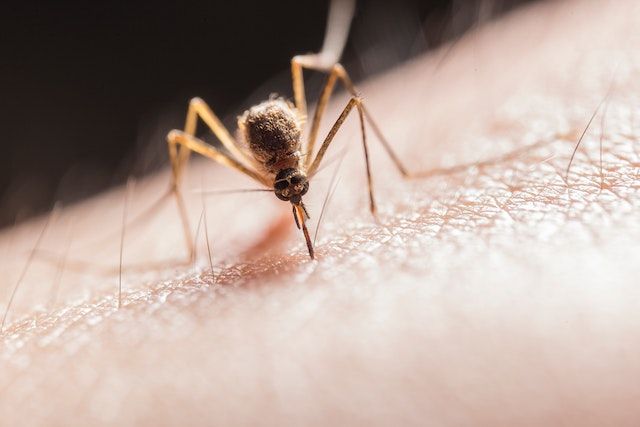
Preventing bug bites is key to enjoying any outside activities, especially camping. Unfortunately though, even with the utmost prevention, getting bitten does occasionally happen.
If you do get bitten, here are some tips for treating bug bites:
- Clean the bite: Wash the area with soap and water to reduce the risk of infection.
- Use peppermint oil: Since peppermint oil is anti-inflammatory, it will greatly lessen any itching, burning or stinging. It’s excellent antimicrobial properties will also reduce any possible infection.
- Remove ticks: If you've been bitten by a tick, use tweezers to grasp the tick as close to your skin as possible and gently pull it out. Be sure to clean the bite area afterwards.
- Avoid scratching: Scratching bug bites can cause further irritation and increase the risk of infection. Apply a cold compress or anti-itch cream to help relieve itching.
- Monitor for symptoms: Keep an eye out for any signs of infection or unusual reactions, such as severe pain, swelling, or rash. If these occur, consult a healthcare professional as soon as possible.
By knowing how to treat bug bites, you can reduce any discomfort or infections that will put a damper on your activities.
Insect-Borne Diseases and their Symptoms

You need to be vitally aware of the various insect-borne diseases that you may encounter due to insect bites.
Insect-borne diseases are transmitted by mosquitoes, ticks, flies, and other critters. These diseases can cause serious health problems if not properly addressed. The following are some of the most common insect-borne diseases that campers should be aware of:
Malaria is a mosquito-borne disease caused by a parasite. It is prevalent in tropical and subtropical regions and can lead to severe complications or even death if left untreated. Common symptoms include fever, chills, and flu-like symptoms.
Lyme disease is a tick-borne illness caused by the bacterium Borrelia burgdorferi. It is most commonly transmitted through the bite of infected black-legged ticks and can cause long-term complications if not treated early. Symptoms may include fever, headache, fatigue, and a characteristic skin rash called erythema migrans.
Yellow fever is a viral infection spread by mosquitoes. It mainly occurs in Africa and South America and can cause symptoms like fever, chills, headache, and nausea. Yellow fever can lead to severe complications and even death if not treated promptly.
Zika virus is primarily transmitted through the bite of an infected Aedes species mosquito. It can cause mild symptoms, such as fever, rash, joint pain, and conjunctivitis, or no symptoms at all. Pregnant women are at a higher risk due to the potential for adverse birth outcomes.
Dengue is another mosquito-borne viral infection, commonly found in tropical and subtropical areas. Symptoms may include sudden high fever, severe headache, joint and muscle pain, and rash. Though most cases are mild, severe dengue can be life-threatening.
Chikungunya is transmitted by mosquitoes and causes symptoms similar to dengue. It is prevalent in regions of Africa, Asia, Europe, and the Indian and Pacific Oceans. Although the disease is rarely fatal, it can cause severe joint pain and fatigue lasting for weeks or months.
Tick-borne diseases are many, and just a few examples are Lyme disease, Rocky Mountain spotted fever, and tick-borne encephalitis. These diseases can cause a range of symptoms from mild to severe and often require antibiotic treatment.
Lastly, the West Nile virus is primarily transmitted through the bite of an infected mosquito. Most people infected with the virus do not develop symptoms, but some may experience flu-like symptoms, such as fever, headache, body aches, and rash.
In order to avoid these insect-borne diseases, it is crucial to take necessary precautions, like using insect repellent, wearing protective clothing, and staying informed about the risks in the area where you'll be camping.
Bug Bite Safety Precautions for Children and Sensitive Skin when Camping
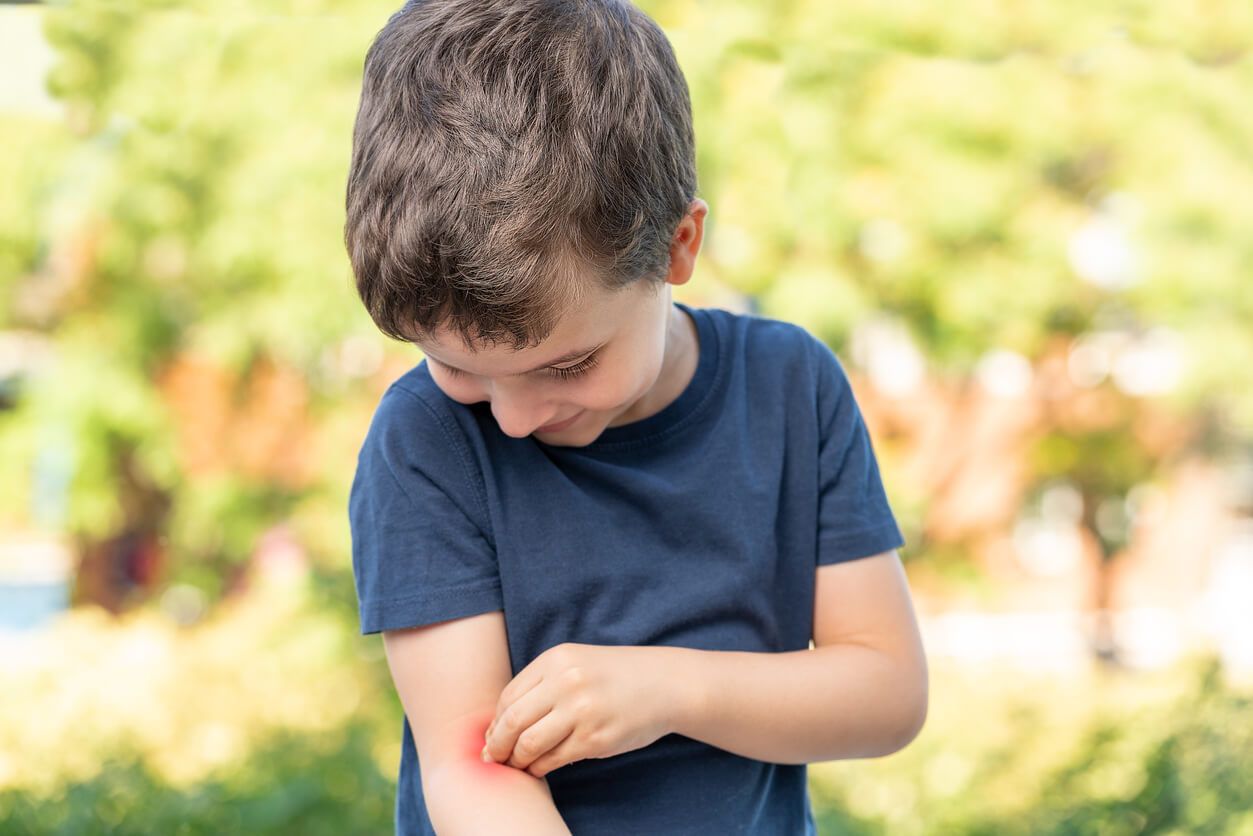
Taking proper safety precautions is paramount when camping, especially for children and those with sensitive skin.
One important step you can take is to dress appropriately. Dress your children and yourself in clothing that covers arms and legs as much as possible. Opting for long-sleeved shirts, pants, socks, and closed shoes will provide better protection against bug bites.
For added protection, you can treat clothes, shoes, and gear with 0.5% permethrin, which can effectively repel insects.
When choosing insect repellents, it's crucial to select the right product. The Environmental Protection Agency (EPA) has confirmed that DEET-based products are safe and effective when used properly. Follow label instructions carefully and apply repellents on exposed skin. For sensitive skin, it is recommended to patch test the product before full application.
To protect babies and young children, ensure their sleeping areas are covered. Utilize mosquito netting when and where necessary to shield strollers and baby carriers. This prevents mosquitoes and other biting insects from reaching your child while they rest.
To keep your camping site bug-free, consider eliminating standing water in the surrounding areas. Standing water can be a breeding ground for mosquitoes, increasing their population around your campsite. By emptying containers, pots, or other stagnant water sources, you can help prevent the spread of insects in the area.
Remember to always keep a watchful eye on kids when outdoors, as they can easily run into bug-infested spots like wooded areas, heavy brush, etc. Also ensure that they don’t play or hang around in places that are overgrown with weeds, grass, and other foliage, as these are breeding grounds for critters.
Frequently Asked Questions
What are effective methods to deter mosquitoes during a camping trip?
When away while camping, use any insect repellent or bug spray containing DEET, picaridin, or oil of lemon eucalyptus. You can also set up mosquito nets or screens around your sleeping bag or living area. Avoid areas near standing water and wear long sleeves and pants to minimize exposed skin.
Which plants can help repel insects while camping?
Some plants known to repel insects include citronella, lavender, marigolds, lemongrass, and basil. You can bring some of these plants along in pots to place around your campsite or use their essential oils to create a homemade insect repellent.
What are the most common bug bites while camping?
Bug bites from chiggers, mosquitos, and ticks are by far the most common. But remember that bites and stings from flies, bees, gnats, and a bunch of other pests are also frequent. Following the advice in this article should work well against all of these unwanted guests.
What scents do bugs stay away from?
Peppermint, lavender, sage, thyme, citronella, and eucalyptus are all scents that most bugs are repelled by. Catnip oil is another one.
Will rubbing alcohol keep bugs from biting me?
In a pinch, applying rubbing alcohol to your skin can work as a bug repellent, but this method isn’t nearly as good as the others mentioned here.
Do citronella bug bracelets and mosquito repellent bracelets really work?
While some people claim they are effective, personally, they’ve never worked for me. They might help to some degree, but in my humble opinion, they’re gimmicks more than anything. Put simply, the repellents in these bracelets aren’t concentrated (powerful) enough to have any meaningful affect. Using bug spray repellent on your clothes gets much better results.
How do I avoid chiggers while camping?
Just like with the other bugs and insects mentioned in this article, you’ll want to do the following…
- Avoid areas with thick brush and overgrown grass
- Wear pants and long-sleeved shirts if heading into the woods or other similar places
- Tuck your pant cuffs into your socks to seal them up
- Don’t wear any perfume or cologne, as insects are attracted to these sweet scents
- Use a quality bug spray or insect repellent
How can I remove a tick?
Use the method explained here to safely remove a tick: https://www.cdc.gov/ticks/removing_a_tick.html
What precautions can be taken to minimize the risk of tick bites?
To minimize the risk of tick bites, avoid tall grassy areas, stick to well-trodden paths, and wear long sleeves and pants. Also, tuck your pants into your socks and use an insect repellent containing DEET, picaridin, or permethrin. Be sure to regularly check yourself and your companions for ticks…especially pets.
How can I prevent ticks from biting my dog when camping?
Use a flea & tick collar, for starters. Next, apply a veterinarian-approved insect repellent spray. Lastly, keep your dog out of heavily wooded or overgrown areas, or places with standing/stagnant water.
Never use insect repellent made for humans on dogs, as it could be toxic!
How can one use clothing items to prevent bug bites?
Wear long-sleeved shirts and long pants to reduce exposed skin, and choose light-colored fabrics that make it easier to spot insects. Also, consider using clothing treated with permethrin, a repellent that keeps bugs at bay. Tuck your pants into your socks to prevent insects from crawling up your legs.
Which types of insect repellents are best suited for camping?
Insect repellents containing DEET, picaridin, or oil of lemon eucalyptus are effective in warding off a wide range of insects. Remember that higher concentrations provide longer protection. You can choose between sprays, creams, or wipes depending on your preference and convenience.
Do campfires help in keeping biting insects at bay?
Yes, campfires can help deter insects, as they are usually repelled by smoke. Additionally, burning specific materials like sage, lavender, or citronella can enhance the repellent effect of the smoke. Keep in mind that campfires are not a foolproof method and should be used in conjunction with other bug prevention measures.
Final Thoughts
As you’ve seen, you don’t have to let bug bites or mosquitoes ruin your camping experience! By knowing how to avoid these pests, planning ahead, and following the tips in this article, you can defeat bugs like a pro.
Get outside and enjoy the magic of nature. With the right defenses bugs can’t win :)
LIVE WISELY, LIVE WELL!

